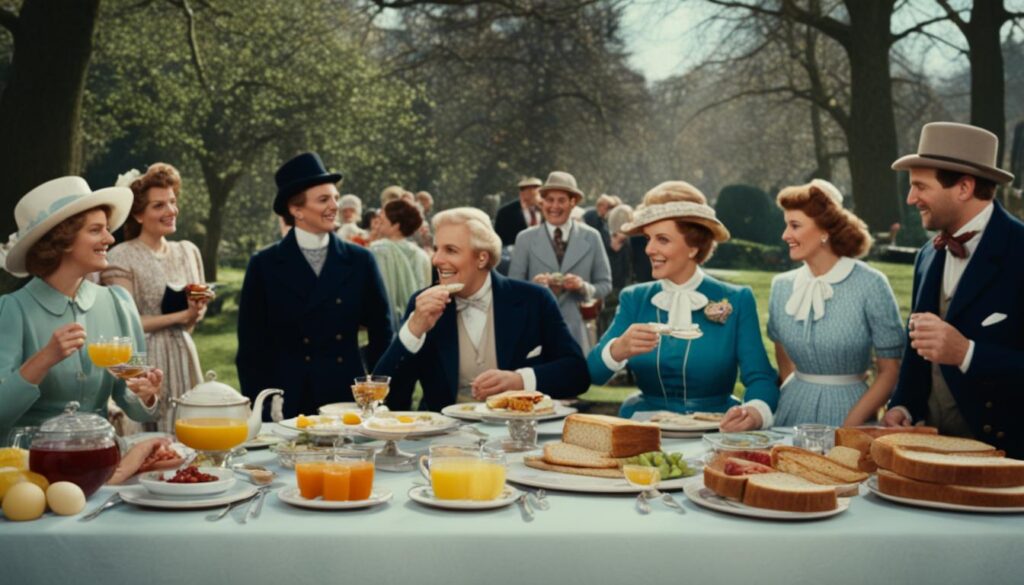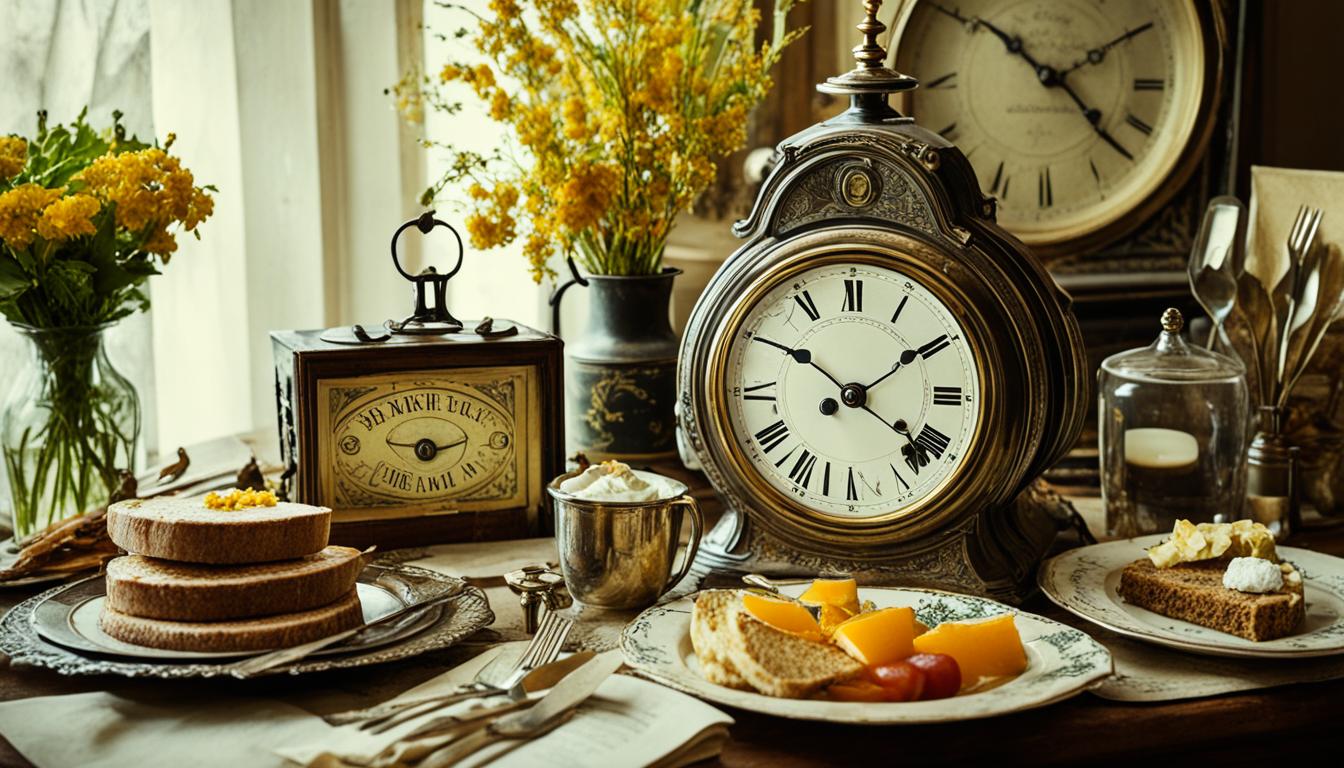Brunch Was First Used as a Term in 1895
The origin of brunch dates back to 1895 when British author Guy Beringer first coined the term in his essay “Brunch: A Plea” for Hunter’s Weekly. Beringer introduced the concept of a breakfast-lunch hybrid, suggesting that readers forgo their heavy Sunday meals in favor of a lighter fare served earlier in the day. This brunch history tidbit marks the beginning of the evolution of the beloved weekend tradition.
In 1896, The New Oxford, a Pennsylvania newspaper, described the latest dining “fad” in which guests ate after 11 a.m. Initially considered an upper-class experience, the meaning of brunch was largely reserved for households that had the time and resources to host guests for a leisurely midday meal. The origin of the brunch term and its association with a particular social class set the stage for its future development and widespread popularity.
Key Takeaways
- The word “brunch” was first used in 1895 by British author Guy Beringer
- Beringer proposed a breakfast-lunch hybrid meal in his essay “Brunch: A Plea”
- The concept of brunch gained attention in the U.S. in 1896
- Brunch was initially an upper-class experience due to the time and resources required
- The origin of brunch set the foundation for its future evolution and popularity
The Origin of the Word “Brunch”
The brunch word origin can be traced back to an 1895 essay titled “Brunch: A Plea” by British author Guy Beringer, published in Hunter’s Weekly. In his essay, Beringer argued that instead of the traditional post-church early dinner common in England at the time, a hybrid meal combining breakfast and lunch should be served around noon. This meal, he proposed, would be ideal for “Saturday-night carousers” to enjoy.

Beringer elaborated on the benefits of brunch, stating, “Brunch is cheerful, sociable and inciting. It is talk-compelling. It puts you in a good temper, it makes you satisfied with yourself and your fellow beings, it sweeps away the worries and cobwebs of the week.” His vision for the brunch term meaning was a meal that would start with breakfast food and gradually include heavier dishes toward the end.
The brunch word history reveals that the term itself is a portmanteau, combining the words “breakfast” and “lunch.” This clever amalgamation perfectly captures the essence of the meal, which serves as a late-morning or early-afternoon combination of both breakfast and lunch dishes. As the concept gained popularity, the term “brunch” became firmly established in the English language, cementing its place in culinary history.
The Rise of Brunch in the United States
The popularity of brunch in America began to soar in the 1930s, thanks in part to celebrities who would often stop for a late breakfast while on transcontinental train trips. This period also saw a rise in the number of women entering the workforce, which led to an increased demand for a Sunday meal that would allow for a break from cooking at home. The influence of Hollywood helped bring brunch in the United States to the mainstream, and by 1939, The New York Times declared Sunday a “two-meal day.”
The association of alcohol with brunch started as early as the 1920s among upscale diners, despite Prohibition. This trend continued to grow, and serving cocktails with brunch became more common in the 1950s due to changing social norms. The history of brunch in the United States is closely tied to the evolving lifestyles and social dynamics of the American population. As brunch culture expanded, it mirrored broader societal changes, including the impact of World War I on women’s roles and the shift in social expectations regarding dining. The interplay between economic shifts and the rise of leisure time provided fertile ground for the meal’s popularity, leading to unique variations across different regions. Thus, the history of brunch not only reflects culinary trends but also serves as a lens through which we can examine cultural shifts, including those prompted by wwi and the modern bra evolution.
As the origin of brunch in the US gained momentum, restaurants and hotels began to offer more elaborate brunch menus to cater to the growing demand. The meal became a staple for many Americans, particularly in urban areas, as it offered a relaxed and sociable dining experience. Today, brunch remains a beloved tradition across the country, with countless variations and regional specialties that showcase the diverse culinary landscape of the United States.
The Evolution of Brunch Culture
Over time, brunch has transformed from a post-church or post-hunt meal into a beloved weekend tradition. Some attribute the origins of brunch to the English tradition of feasting after a hunt, while others believe it stems from the Catholic practice of fasting before church and indulging in a hearty meal afterward. However, proud New Yorkers claim that brunch emerged from the city’s incredible breakfast and lunch options available after a night out on the town. As brunch gained popularity, it became an opportunity for people to socialize outside of religious settings and enjoy signature cocktails like bloody marys and mimosas.
While Guy Beringer, who coined the term “brunch” in his 1895 essay A Plea for Brunch, initially suggested replacing whiskey and beer with tea and coffee, by the mid-20th century, alcoholic beverages had become an integral part of the brunch experience. This shift in brunch culture allowed for a more relaxed and indulgent atmosphere, making it an increasingly popular weekend activity.
Modern brunch has evolved to encompass a wide array of cuisines and dining experiences, from classic comfort foods to innovative fusion dishes. Brunch menus now feature everything from pancakes and waffles to sushi and tacos, catering to diverse tastes and dietary preferences. Additionally, brunch has become a platform for restaurants and chefs to showcase their creativity and culinary skills, often incorporating local and seasonal ingredients into their offerings. As brunch continues to evolve, it remains a beloved tradition that brings people together to enjoy great food, drinks, and company.
The rise of social media has further fueled the popularity of brunch, with countless posts showcasing visually stunning dishes and trendy brunch spots. This has led to the emergence of brunch influencers and food bloggers who share their experiences and recommendations, driving brunch trends and shaping brunch culture. From Instagram-worthy avocado toast to over-the-top bloody mary garnishes, the influence of social media on brunch cannot be overstated. As brunch continues to adapt and evolve, it is clear that this beloved meal will remain a staple of weekend dining for generations to come.











